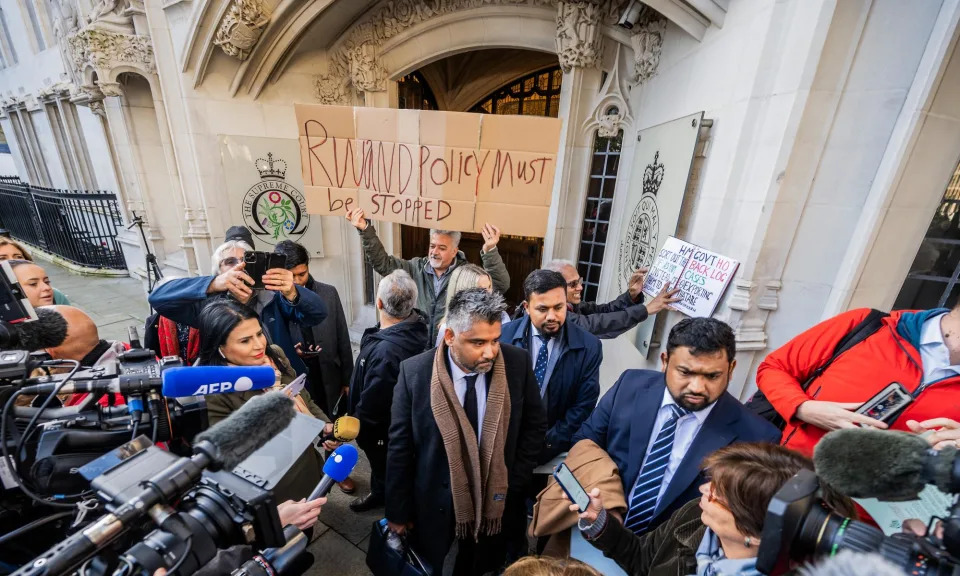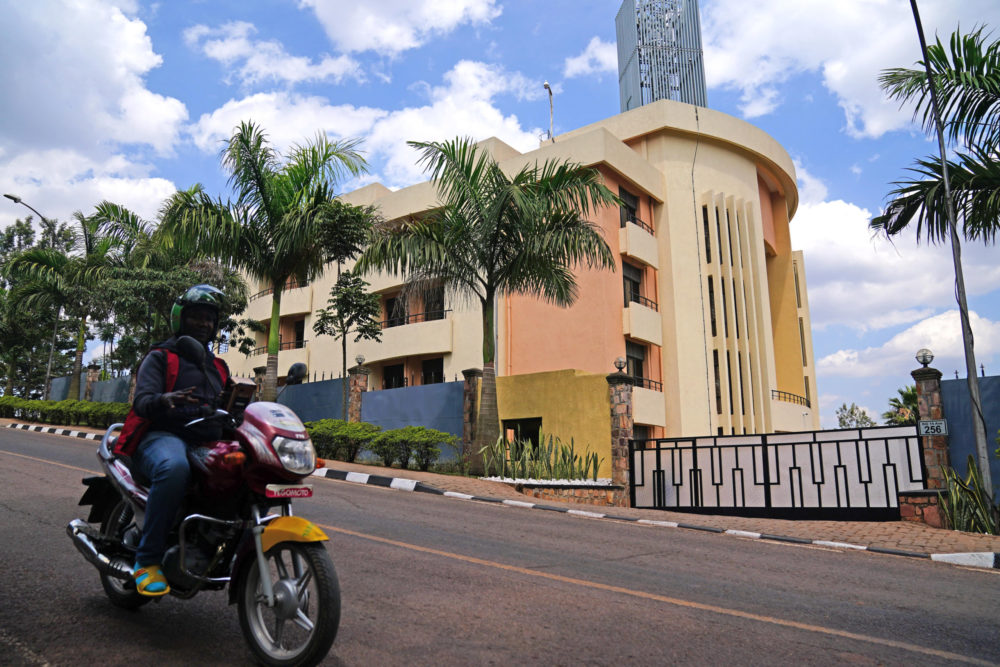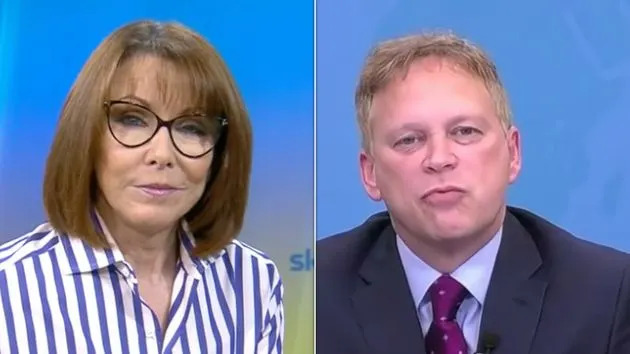The Rwanda plan is failing – so watch as our cowardly government blames the civil service
Dave Penman
Sun, 10 December 2023

Photograph: Guy Bell/Shutterstock
It was not always inevitable that a policy going badly wrong would lead to blame falling on the civil service. Unfortunately, it is increasingly becoming so. The more desperate the political situation, the more likely it is that the government will find an individual or department to blame. All the better because they can’t answer back.
The Rwanda scheme fits neatly into this scenario. It is by any measure a controversial policy; even its cheerleaders would admit that. There are, of course, moral arguments about the policy – but there are also practical questions. Is it workable? Is it legal? Will it give value for money? The job of the civil service is to work through these quandaries with ministers.
When the Home Office permanent secretary, Matthew Rycroft, appeared before the home affairs select committee at the end of last month, he came close to confirming that the legal advice the government had received was that at least one of the various legal challenges to the scheme was likely to succeed. Ministers would have been told about those challenges. It is cowardly to then start blaming those who have advised them when their political choices lead to failure, as was the case last week, when we once again saw senior government figures briefing the press to suggest that officials are throwing up objections because they “just don’t like” the policy. Of course, supporters of the scheme were quick to seize on this narrative, with the Conservative MP Neil O’Brien apparently believing that the advice from the government’s legal department is “guff”. Since then, Rycroft has been summoned to appear before the public accounts committee on Monday to explain how the costs of the scheme have risen from £140m to £290m.
The Rwanda debacle, rather than proving that the civil service is trying to inhibit the will of the government, has ably demonstrated that the civil service has actually been doing its job. I suspect that civil servants told ministers this is exactly where we’d be, which is what the civil service is there to do.
Civil servants are just like everybody else – they have their own political and moral views. But where they do differ from most of us is that they know to leave them at the door when they come to work. Those working in the Home Office are fully aware that they will have to deal with controversial policies, regardless of the party in government. But there will be genuine doubt as to whether the Rwanda scheme will deliver what it’s supposed to: deterring those who arrive in the UK in small boats. When it was introduced, the permanent secretary required a ministerial direction – a mechanism in which ministers give their department a formal instruction to proceed with a spending proposal. This was needed because there was no evidence to suggest that the outcome envisaged – reducing the number of people seeking asylum – would be delivered. The permanent secretary could not say it was a good use of taxpayers’ money as there was insufficient evidence to demonstrate that. Ministers are entitled to ignore that lack of evidence, but it is the job of a civil servant to point it out.
There will undoubtedly be frustration within the Home Office about the amount of resources poured into a policy that was always likely to fail, especially when there are other projects of equal public concern that suffer because of the distraction. The job of a civil servant is to pose that conundrum to ministers. Are there alternatives to this policy that could deliver the same objectives? Are there other priorities of government that are being overlooked? To govern is to choose, and in the current fiscal environment, ministers are choosing to spend a thus far unspecified amount of money on a scheme that is yet to deliver anything but headlines. Inevitably this will be at the cost of other areas of policy or delivery. Again, this is entirely a political decision. To blame civil servants for the outcomes of their own poor political choices shows a weakness not only in the policy, but in the ministers themselves.
Dave Penman is general secretary of the FDA union
UK Government accused of ‘choosing to ignore’ legal advice over Rwanda plan

The UK Government has been accused of “choosing to ignore” advice from senior lawyers over its stalled Rwanda plan.
Described as a rare move in a bid to win over critics, the Government published a summary of its legal position in support of the scheme on Monday.
The document concludes that there is a “clear lawful basis on which a responsible government may proceed” with a “novel and contentious policy”.
But a leading Tory rebel said: “The Government is choosing to ignore advice from senior lawyers that there are good legal arguments for blocking off individual claims and all Strasbourg Rule 39 injunctions.
“Migrants can still make individual claims but these would continue in Rwanda. The Government should ensure that only those who are under 18 or medically unfit to fly are exempt from removal.
“It’s open to Parliament to block or restrict individual legal challenges and the courts will uphold this.”
Summary
The summary of the Government’s legal position said: “The treaty, Bill and evidence together demonstrate Rwanda is safe for relocated individuals, that the Government’s approach is tough but fair and lawful, that it has a justification in the UK’s constitution and domestic law, and it seeks to uphold our international obligations.
“This is a novel and contentious policy and the UK and Rwanda are the first countries in the world to enact it together.
“There are risks inherent in such an innovative approach but there is a clear lawful basis on which a responsible government may proceed.
“For the reasons set out in this paper, a Bill that sought to oust all individual claims would not provide such a basis.”
It said “evidence” will be published on Tuesday which demonstrates Rwanda is a safe country, as MPs prepare to vote on the Safety of Rwanda (Asylum and Immigration) Bill.
Asylum accommodation
The Government estimates the cost of asylum accommodation alone could rise to £32 million per day by 2026, equivalent to £11 billion per year, if “illegal migration goes unaddressed”, the document said, as it argued the case for needing to use “all the powers at its disposal to prevent and deter unlawful migration”.
According to the summary, illegal migration via Channel crossings is a “matter of significant public concern” and this places “substantial additional burdens on to public services”.
It said the Bill is “predicated on both Rwanda and the UK’s compliance with international law in the form of the treaty, which itself reflects the international legal obligations of the UK and Rwanda”, while warning that the country’s government has “also been clear that it would withdraw from involvement in the scheme if the UK were to breach its international obligations, therefore rendering the Bill unable to work in achieving the policy intention of deterrence – as there would be no safe country for the purposes of removal”.
“No-one will be sent into a position where they would face a real risk of harm”, it adds.
The Bill would be the first time in British legal history where the country’s courts would be precluded from considering claims under certain sections of human rights laws.
Legal challenges
But it still allows an “exceptionally narrow route” for migrants to bring legal challenges against their deportation.
There would be a “very high barrier” set for legal challenges, the summary said.
The summary said: “It is not, however, possible for Parliament reasonably to conclude that Rwanda will always be safe for every potential individual liable to removal at any point in the future, irrespective of their specific personal circumstances.
“For that reason, the Bill does allow for an exceptionally narrow route to individual challenge to ensure that the courts will interpret the relevant provisions in accordance with the will of Parliament.
“Not to do so would mean ministers accepting that those unfit to fly, for example those in the late stages of pregnancy, or sufferers of very rare medical conditions that could not be cared for in Rwanda, could be removed with no right to judicial scrutiny.
“In any case, completely blocking any court challenges would be a breach of international law and alien to the UK’s constitutional tradition of liberty and justice, where even in wartime the UK has maintained access to the courts in order that individuals can uphold their rights and freedoms.
“The Bill limits unnecessary challenges whilst maintaining the principle of access to the courts where an individual may be at a real risk of serious and irreversible harm.
“Taken as a whole, the limited availability of domestic remedies maintains the constitutional balance between Parliament being able to legislate as it sees necessary, and the powers of our courts to hold the Government to account.”
'It's Never Going To Work': Kay Burley Clashes With Grant Shapps Over Tory Rwanda Plan
Kevin Schofield
Mon, 11 December 2023
Kay Burley and Grant Shapps
Kay Burley told Grant Shapps that the government’s plan to deport asylum seekers to Rwanda is “never going to work” during a tense interview this morning.
The pair clashed as rival factions of Tory MPs prepare to meet later today to decide whether or not to vote for emergency legislation aimed at finally getting flights to the African country off the ground.
Right-wing MPs believe the bill does not go far enough, while their moderate colleagues are uncomfortable that it would give ministers rather than the courts the power to declare Rwanda a safe country.
On Sky News this morning, Shapps insisted that the government’s plans to tackle illegal immigration had already seen the number of small boats crossing the Channel reduce by a third.
But Burley told him there was no evidence that the Rwanda plan would deter asylum seekers from trying to make the perilous crossing.
She said: “Why don’t you guys just accept that this is not going to work, cut your losses and forget about it and look at other ways to make this work?”
Shapps replied: “I think that would be incredibly defeatist. The point of this is that so far, as I’ve mentioned, we’ve slashed crossing this year by a third.”
As Burley interrupted to point out that was “nothing to do with Rwanda”, Shapps went on: “Every single measure that we’ve introduced has been opposed by the Labour Party.”
But the exasperated presenter said: “We’re not talking about Labour, minister, we’re talking about you guys.
“It’s symbolism, it’s never going to work, the planes are never going to take off and it’s about time you cut your losses.”
Shapps hit back: “I just don’t agree and that sort of defeatism might suit others. We won’t stop doing it just because it’s difficult to get through.”
Later in the interview, Burley asked him when the first flight carrying asylum seekers to Rwanda will take off.
The minister replied: “It’s impossible to know exactly because parliament needs to pass it first of all. That can be sped through if Labour finally want to get behind a plan to stop people trafficking.”
He added: “Doubtless these things will be tested in court. We believe this legislation is the way to make sure it is legally robust and gets through the courts.”











 China sees success in Mexican auto industry
China sees success in Mexican auto industry